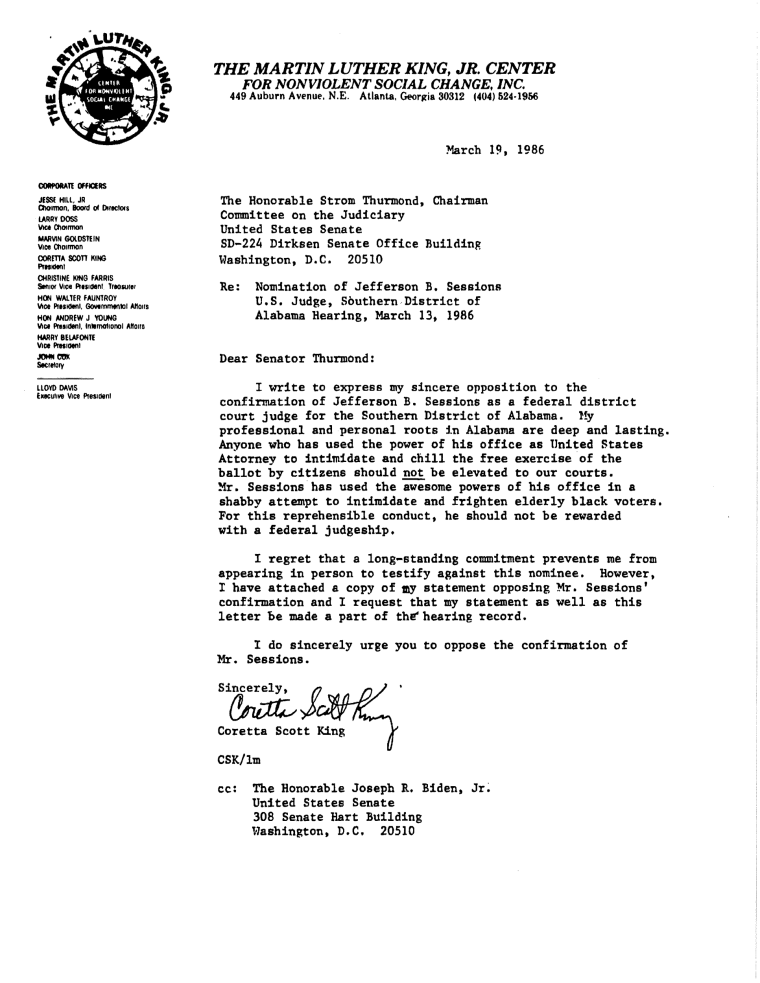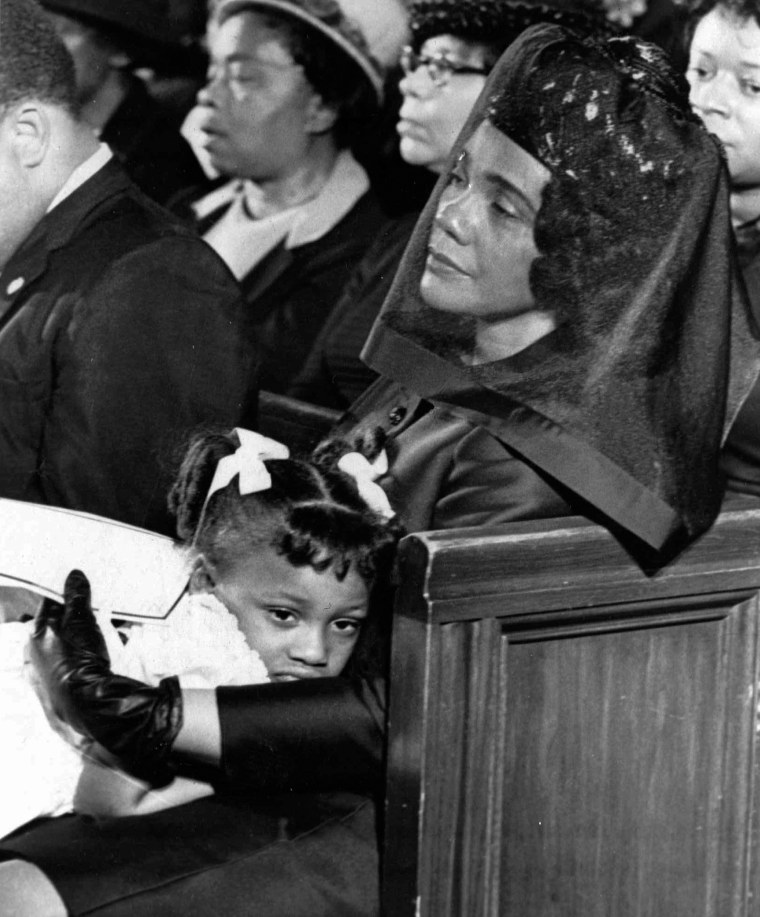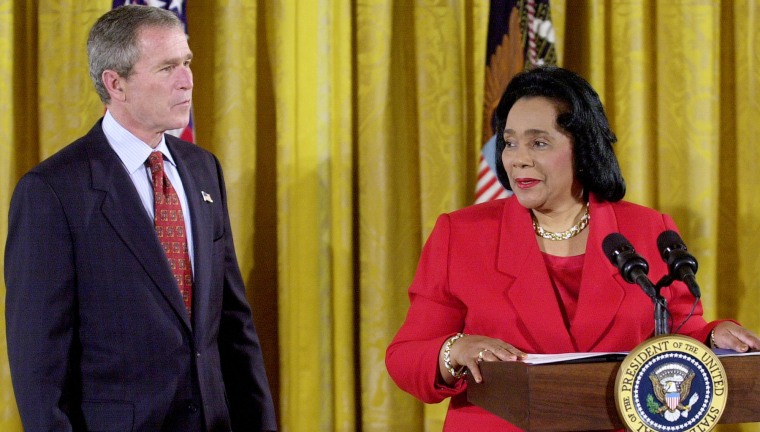Senate Republicans voted on Tuesday to silence Democratic Senator Elizabeth Warren by invoking Senate Rule 19.
Majority Leader Mitch McConnell, R-Kentucky, censored the Massachusetts legislator for “impugning the motives and conduct” of Sen. Jeff Sessions by reading a letter from the widow of Martin Luther King, Jr. that criticized Sessions' civil rights record.
The unusual move came during a debate on Trump’s nominee for attorney general and drew renewed attention to Sessions, who is expected to be confirmed later on Wednesday.
So who was Coretta Scott King? What did her letter say? And what is Senate Rule 19 all about?
Who was Coretta Scott King?
The Alabama native and accomplished singer carried on her husband's civil rights legacy as a proponent of racial justice in the United States long after his assassination in 1968.
She helped lead the charge to create a national holiday in his honor and established the Martin Luther King Jr. Center for Non-Violent Social Change in Atlanta, which is both a museum and a center for activism.
King, who grew up in rural poverty in the segregated South, met her husband while she was studying music at the New England Conservatory of Music in Boston in 1952. He always said she was not just a supportive spouse, but an active partner in his mission for justice.
The mother of four took on her husband’s mantle after his death, but also promoted her own causes, like women’s rights, the struggle against apartheid in South Africa and other human rights issue.
She rose to become an international symbol — like Jackie Kennedy — of a woman who overcame tragedy, held her family and became an inspiration because her graceful presence through it all. She died in 2006.
What does King's letter say?

When Sessions was nominated for a position as a federal judge for the Southern District of Alabama in 1986, King sent a letter to the Senate Judiciary Committee considering his nomination.
King wrote the letter to express her “sincere opposition” to Session’s nomination to the federal bench. At the time, Sessions was the U.S. Attorney for the Southern District of Alabama.
In the letter, King wrote that “Mr. Sessions has used the awesome power of his office to chill the free exercise of the vote by black citizens in the district he now seeks to serve as a federal judge. This simply cannot be allowed to happen. Mr. Sessions’ conduct as U.S. Attorney, from his politically-motivated voting fraud prosecutions to his indifference toward criminal violations of civil rights laws, indicates that he lacks the temperament, fairness and judgement to be a federal judge.”
King wrote that Sessions had used his power as U.S. Attorney to try to intimidate black voters through a series of voter fraud prosecutions brought by his office in 1984.

“The irony of Mr. Sessions’ nomination is that, if confirmed, he will be given life tenure for doing with a federal prosecution what the local sheriffs accomplished twenty years ago with clubs and cattle prods," she wrote.
King alleged that through his prosecutions Sessions singled out older black voters who had been leaders of the civil rights movement and that the result was “frightening — the wide-scale chill of the exercise of the ballot box for blacks, who suffered so much to receive that right in the first place.”
Sessions’ nomination for the federal judgeship in 1986 failed when he was not confirmed by the Senate.
When he later became a senator for Alabama in 1997 and joined the Senate Judiciary Committee, which still included three members who had killed his nomination, he called it a “great irony.”
What is Senate Rule 19?
Senate Rule 19 states that "no senator in debate shall, directly or indirectly, by any form of words impute to another senator or to other senators any conduct or motive unworthy or unbecoming a senator.”
Why does the rule exist?
The framers of the constitution deliberately set up two chambers of legislative branch: the often raucous House of Representatives, which currently has 535 members, and the more senior chamber, the U.S. Senate, made up of only 100 members.
Since the Senate is made up of two members from each of the 50 states who serve six-year overlapping terms, it is meant to be a collaborative chamber where reasoned debate can take place.
PHOTOS – Martin Luther King, Jr.: The Civil Rights Icon’s Life in Pictures
“The Senate has always been something of a club, since its creation,” explained Iwan Morgan, Professor of United States Studies at University College London (UCL). “The notion was that senators would address each other in a collegial way."
Rule 19 exists so that senators can have an open debate in a respectful and civil environment without fear of being personally insulted and demeaned by their colleagues.
“The Senate is a very genteel body. But that gentility has been fraying as the parties have become more polarized,” Morgan said. And “old rules can still be invoked as they were in this case.”
How often is it enforced?
Not very often because senators tend to abide by it, said Morgan. But Democrats have argued that the rule has been wielded selectively.
For instance, Sen. Ted Cruz accused fellow Republican McConnell of lying on the Senate floor in 2015. But he was not censored by Rule 19.
“Selective invocation does seem to undermine the rule,” said Morgan.
Why were other Democrats allowed to read the letter?
Republican leadership aides say it was the totality of Warren's speech that resulted in her being silenced in violation of Rule 19.
McConnell's office says that because Warren was warned for comments made before she read the King letter, she had already been alerted to the possibility of being silenced using Rule 19. The first warning on Tuesday night came after Warren read Sen Ted Kennedy's statement in opposition of Sessions in 1986, a statement which concludes with this line: "He is, I believe, a disgrace to the Justice Department and he should withdraw his nomination and resign his position."
What now?
When the senators voted to uphold McConnell’s objection to Warren, she was silenced on the Senate floor until the debate over Sessions nomination is complete. And Sessions is expected to become Attorney General.
But that hasn't stopped the liberal firebrand, and she posted a video of herself reading the King letter on Facebook Tuesday evening. By Wednesday at about 10:45 a.m. ET, it had more than 6.3 million views and #LetLizSpeak was trending on Twitter.

